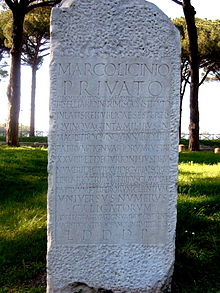Collegium (ancient Rome)
This article needs additional citations for verification. (December 2009) |

A collegium (plural collegia), or college, was any association in ancient Rome with a legal personality. Such associations could be civil or religious. The word collegium literally means "society", from collega (‘colleague’).[1]
Civil collegia
Collegia could function as guilds, social clubs, or burial societies; in practice, in ancient Rome, they sometimes became organized bodies of local businessmen and even criminals, who ran the mercantile/criminal activities in a given urban region (similar to a rione). The organization of a collegium was often modeled on that of civic governing bodies, the Senate of Rome being the epitome. The meeting hall was often known as the curia, the same term as that applied to that of the Roman Senate.
By law, only three people were required in order to create a legal collegium;[citation needed] the only exception was the college of consuls, which included only the two consuls.
The Roman emperor Aurelian imposed state control over collegia in the late 3rd century.[2]
Religious collegia
There were four great religious colleges (quattuor amplissima collegia) of Roman priests, in descending order of importance:
- Pontifices (the College of Pontifices), headed by the pontifex maximus
- Augures
- Quindecimviri sacris faciundis
- Septemviri epulonum
Other minor religious collegia existed, including:
See also
- College of Aesculapius and Hygia
- List of Ancient Roman Collegia
- Municipium - municipal authorities.
References
- ^ "college". Merriam-Webster.com Dictionary. Merriam-Webster. "from Latin collegium society, from collega colleague"
- ^ Boatwright, Mary T.; Gargola, Daniel J.; Lenski, Noel; Talbert, Richard J.A. (2012). The Romans: From Village to Empire. New York: Oxford University Press. p. 434. ISBN 978-0-19-973057-5.
External links
 Media related to Ancient Roman collegia at Wikimedia Commons
Media related to Ancient Roman collegia at Wikimedia Commons
